

Circumambulation. Relief of ancient Indian Buddhists (monks at left, a lay couple at right, statues behind) circumambulating a stupa in a chaitya temple Circumambulation[1] (from Latin circum around[2] and ambulātus to walk[3]) is the act of moving around a sacred object or idol.[4] Circumambulation of temples or deity images is an integral part of Hindu and Buddhist devotional practice (known in Sanskrit as pradakśiṇā).[5] It is also present in other religions, including Christianity, Judaism, and Islam.
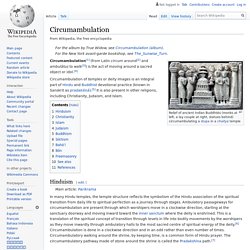
Hinduism[edit] In many Hindu temples, the temple structure reflects the symbolism of the Hindu association of the spiritual transition from daily life to spiritual perfection as a journey through stages. Ambulatory passageways for circumambulation are present through which worshipers move in a clockwise direction, starting at the sanctuary doorway and moving inward toward the inner sanctum where the deity is enshrined. Christianity[edit] Islam[edit] Muslims circumambulating the Kaaba.
Advaita Vedanta. School of Hindu philosophy, a classic path to spiritual realization Advaita Vedanta traces its roots to the oldest Upanishads.
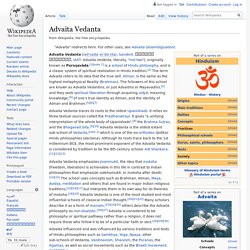
It relies on three textual sources called the Prasthanatrayi. It gives "a unifying interpretation of the whole body of Upanishads", the Brahma Sutras, and the Bhagavad Gita.[10] Advaita Vedanta is the oldest extant sub-school of Vedanta,[note 2] which is one of the six orthodox (āstika) Hindu philosophies (darśana). Although its roots trace back to the 1st millennium BCE, the most prominent exponent of the Advaita Vedanta is considered by tradition to be the 8th century scholar Adi Shankara.[12] Themistocles. Themistocles (; Greek: Θεμιστοκλῆς Greek pronunciation: [tʰemistoklɛ̂ːs] Themistoklẽs; "Glory of the Law";[1] c. 524–459 BC) was an Athenian politician and general.
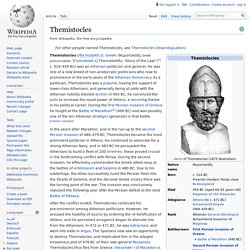
He was one of a new breed of non-aristocratic politicians who rose to prominence in the early years of the Athenian democracy. Themistocles. Themistocles (c. 524 - c. 460 BCE) was an Athenian statesman and general (strategos) whose emphasis on naval power and military skills were instrumental during the Persian wars, victory in which ensured that Greece survived its greatest ever threat.
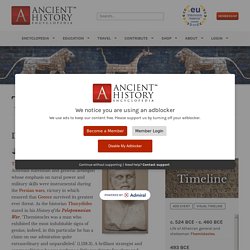
As the historian Thucydides stated in his History of the Peloponnesian War, ‘Themistocles was a man who exhibited the most indubitable signs of genius; indeed, in this particular he has a claim on our admiration quite extraordinary and unparalleled.’ (1.138.3). A brilliant strategist and canny politician he was perhaps a little too thirsty for glory and power for his own good but Themistocles was, without doubt, one of the most important and colourful figures of Classical Athens. Early Life Themistocles life is described by three notable ancient sources: Herodotus (c. 484 - c. 425 BCE), Thucydides (c. 460 - c. 399 BCE), and Plutarch (c. 45 CE - c. 120 CE). Themistocles & Athenian Naval Power.
Themistocles - Livius. Themistocles (c.525-459): Athenian military commander, statesman, and one of the main architects of the Athenian Empire.
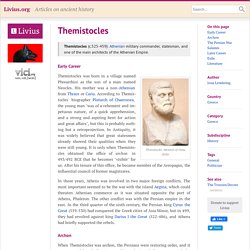
Early Career Themistocles was born in a village named Phrearrhioi as the son of a man named Neocles. His mother was a non-Athenian from Thrace or Caria. According to Themistocles' biographer Plutarch of Chaeronea, the young man "was of a vehement and impetuous nature, of a quick apprehension, and a strong and aspiring bent for action and great affairs", but this is probably nothing but a retroprojection. In Antiquity, it was widely believed that great statesmen already showed their qualities when they were still young.
In those years, Athens was involved in two major foreign conflicts. Archon. Biography & Facts. Themistocles, (born c. 524 bce—died c. 460), Athenian politician and naval strategist who was the creator of Athenian sea power and the chief saviour of Greece from subjection to the Persian empire at the Battle of Salamis in 480 bce.
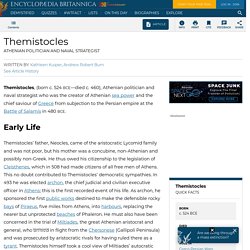
Early life Themistocles’ father, Neocles, came of the aristocratic Lycomid family and was not poor, but his mother was a concubine, non-Athenian and possibly non-Greek. He thus owed his citizenship to the legislation of Cleisthenes, which in 508 had made citizens of all free men of Athens. This no doubt contributed to Themistocles’ democratic sympathies. Artemisia I of Caria. Queen of Halicarnassus, Kos, Nisyros and Kalymnos Artemisia I of Caria (Ancient Greek: Ἀρτεμισία; fl. 480 BC) was a Greek queen of the ancient Greek city-state of Halicarnassus and of the nearby islands of Kos, Nisyros and Kalymnos,[2] within the Achaemenid satrapy of Caria, in about 480 BC.[2] She fought as an ally of Xerxes I, King of Persia against the independent Greek city states during the second Persian invasion of Greece.[3] She personally commanded her contribution of five ships at the naval battle of Artemisium[4] and in the naval Battle of Salamis in 480 BC.
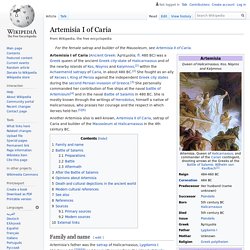
She is mostly known through the writings of Herodotus, himself a native of Halicarnassus, who praises her courage and the respect in which Xerxes held her.[5][6] Xerxes I. Ancient Persian king King of Kings Xerxes I (; Old Persian: 𐎧𐏁𐎹𐎠𐎼𐏁𐎠 Xšayaṛša ( Khshāyarsha ) [2] "ruling over heroes",[3] Greek Ξέρξης Xérxēs [ksérksɛːs]; 519–465 BC), called Xerxes the Great, was the fifth king of kings of the Achaemenid dynasty of Persia.
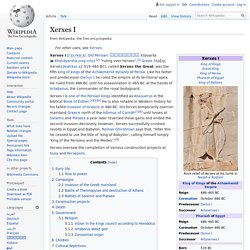
Like his father and predecessor Darius I, he ruled the empire at its territorial apex. Aristides. Athenian general and statesman Aristides (; Greek: Ἀριστείδης, Aristeides; 530–468 BC) was an ancient Athenian statesman.
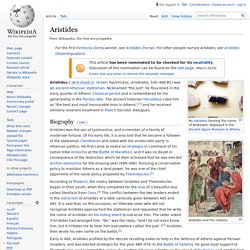
Nicknamed "the Just", he flourished in the early quarter of Athens' Classical period and is remembered for his generalship in the Persian War. The ancient historian Herodotus cited him as "the best and most honourable man in Athens",[1] and he received similarly reverent treatment in Plato's Socratic dialogues. Miltiades. Miltiades (; Greek: Μιλτιάδης; c. 550 – 489 BC), also known as Miltiades the Younger, was a Greek Athenian citizen known mostly for his role in the Battle of Marathon, as well as for his downfall afterwards.
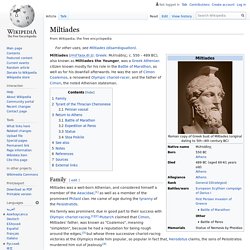
He was the son of Cimon Coalemos, a renowned Olympic chariot-racer, and the father of Cimon, the noted Athenian statesman. Family[edit] Miltiades was a well-born Athenian, and considered himself a member of the Aeacidae,[1] as well as a member of the prominent Philaid clan. He came of age during the tyranny of the Peisistratids. His family was prominent, due in good part to their success with Olympic chariot-racing.[1][2] Plutarch claimed that Cimon, Miltiades' father, was known as "Coalemos", meaning "simpleton", because he had a reputation for being rough around the edges,[3] but whose three successive chariot-racing victories at the Olympics made him popular, so popular in fact that, Herodotus claims, the sons of Peisistratos murdered him out of jealousy.[4]
Sophist. Specific kind of teacher in both Ancient Greece and in the Roman Empire Etymology[edit] The word σοφός gives rise to the verb σοφίζω (sophizo), which means "to instruct" or "make learned", and the passive voice of which means "to become or be wise", or "to be clever or skilled". From the verb is derived the noun σοφιστής (sophistes), which originally meant "a master of one's craft" and later "a prudent man" or "wise man".[1] The word for "sophist" in various languages comes from sophistes.
Themistocles. Pericles. Pericles (l. 495–429 BCE) was a prominent Greek statesman, orator, and general during the Golden Age of Athens. The period in which he led Athens, in fact, has been called the Age of Pericles due to his influence, not only on his city's fortunes, but on the whole of Greek history during the 5th century BCE and even after his death. He was a fierce proponent of democracy, although the form this took differed from the modern day as only male citizens of Athens could participate in politics. Even so, his reforms would lay the groundwork for the development of later democratic political systems.
Pericles' name means "surrounded by glory" and he would live up to his name through his efforts to make Athens the greatest of the Greek city-states. His influence on Athenian society, politics, and culture was so great that Thucydides (l. 460-395 BCE), his contemporary admirer and historian, called him "the first citizen of Athens" (History, II.65). Early Life & Rise to Power. In Praise of Natural Philosophy. John Dupré. David S. Oderberg. Professor David Simon Oderberg (born 1963) is an Australian philosopher of metaphysics and ethics based in Britain since 1987. He is Professor of Philosophy at the University of Reading.[1] He describes himself as a non-consequentialist or a traditionalist in his works.[2] Broadly speaking, Oderberg places himself in opposition to Peter Singer and other utilitarian or consequentialist thinkers.
He has published over thirty academic papers and has authored four books, Real Essentialism, Applied Ethics, Moral Theory, and The Metaphysics of Identity over Time. Professor Oderberg is an alumnus of the Universities of Melbourne, where he completed his first degrees, and Oxford where he gained his D.Phil.[1] Applied Ethics[edit] Books[edit] Opting Out: Conscience and Cooperation in a Pluralistic Society (London: Institute of Economic Affairs, 2018; 158pp.) Articles[edit] Nancy Cartwright. American actress Nancy Jean Cartwright (born October 25, 1957)[1] is an American actress, voice actress, and comedian, known for her long-running role as Bart Simpson on the animated television series The Simpsons.
Cartwright also voices other characters for the show, including Nelson Muntz, Ralph Wiggum, Todd Flanders, Kearney, Database and Maggie. After continuing to search for acting work, in 1987, Cartwright auditioned for a role in a series of animated shorts about a dysfunctional family that was to appear on The Tracey Ullman Show. Brian David Ellis. Alfred North Whitehead. Process philosophy. Process philosophy (or ontology of becoming) identifies metaphysical reality with change and development. Hans Jonas. Jacob Klein. From Wikipedia, the free encyclopedia Jump to navigationJump to search. Thomas Aquinas. Thomas Aquinas (; Italian: Tommaso d'Aquino, lit. 'Thomas of Aquino'; 1225 – 7 March 1274) was an Italian[10][11] Dominican friar, philosopher, Catholic priest, and Doctor of the Church.
Critique of Judgment. Ernst Mayr. German-American evolutionary biologist. Gulliver's Travels. 1726 novel by Jonathan Swift. Royal Society. Mind–body dualism. Natura naturans. Nature. History of science. Phenomenon. Observation. Anecdotal evidence. Experiment. University. Middle Ages. Scholasticism. Alchemy. Protoscience. Chemistry. Metaphysics. Physics. Robert Boyle.
Baconian method. Francis Bacon. Galileo Galilei. Plato. Parmenides. Empedocles. Anaximenes of Miletus. Heraclitus. Anaximander. Advaita Vedanta. Charlotte Buff. Sabbatarianism. Battle of Aphek.